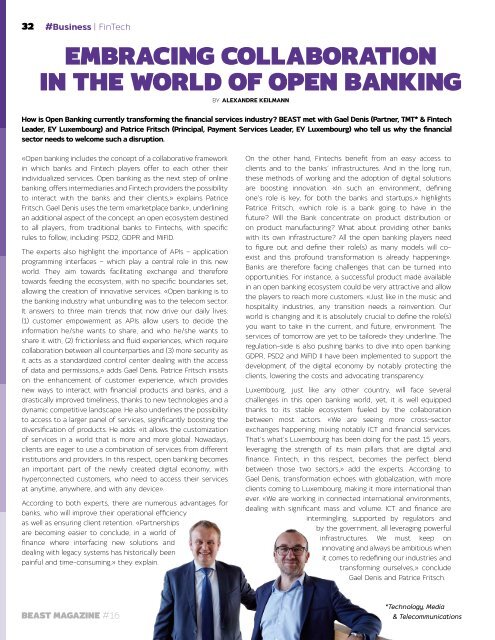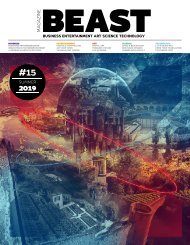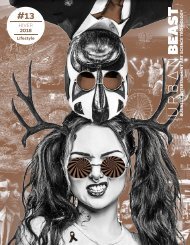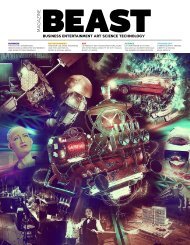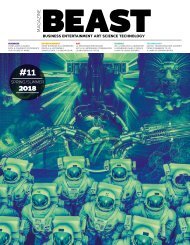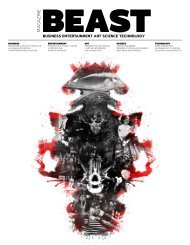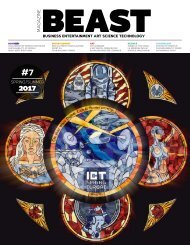Magazine BEAST #16 2019
Create successful ePaper yourself
Turn your PDF publications into a flip-book with our unique Google optimized e-Paper software.
32 #Business | FinTech<br />
EMBRACING COLLABORATION<br />
IN THE WORLD OF OPEN BANKING<br />
BY ALEXANDRE KEILMANN<br />
How is Open Banking currently transforming the financial services industry? <strong>BEAST</strong> met with Gael Denis (Partner, TMT* & Fintech<br />
Leader, EY Luxembourg) and Patrice Fritsch (Principal, Payment Services Leader, EY Luxembourg) who tell us why the financial<br />
sector needs to welcome such a disruption.<br />
«Open banking includes the concept of a collaborative framework<br />
in which banks and Fintech players offer to each other their<br />
individualized services. Open banking as the next step of online<br />
banking, offers intermediaries and Fintech providers the possibility<br />
to interact with the banks and their clients,» explains Patrice<br />
Fritsch. Gael Denis uses the term «marketplace bank», underlining<br />
an additional aspect of the concept: an open ecosystem destined<br />
to all players, from traditional banks to Fintechs, with specific<br />
rules to follow, including: PSD2, GDPR and MiFID.<br />
The experts also highlight the importance of APIs – application<br />
programming interfaces – which play a central role in this new<br />
world. They aim towards facilitating exchange and therefore<br />
towards feeding the ecosystem, with no specific boundaries set,<br />
allowing the creation of innovative services. «Open banking is to<br />
the banking industry what unbundling was to the telecom sector.<br />
It answers to three main trends that now drive our daily lives:<br />
(1) customer empowerment as APIs allow users to decide the<br />
information he/she wants to share, and who he/she wants to<br />
share it with, (2) frictionless and fluid experiences, which require<br />
collaboration between all counterparties and (3) more security as<br />
it acts as a standardized control center dealing with the access<br />
of data and permissions,» adds Gael Denis. Patrice Fritsch insists<br />
on the enhancement of customer experience, which provides<br />
new ways to interact with financial products and banks, and a<br />
drastically improved timeliness, thanks to new technologies and a<br />
dynamic competitive landscape. He also underlines the possibility<br />
to access to a larger panel of services, significantly boosting the<br />
diversification of products. He adds: «it allows the customization<br />
of services in a world that is more and more global. Nowadays,<br />
clients are eager to use a combination of services from different<br />
institutions and providers. In this respect, open banking becomes<br />
an important part of the newly created digital economy, with<br />
hyperconnected customers, who need to access their services<br />
at anytime, anywhere, and with any device».<br />
According to both experts, there are numerous advantages for<br />
banks, who will improve their operational efficiency<br />
as well as ensuring client retention. «Partnerships<br />
are becoming easier to conclude, in a world of<br />
finance where interfacing new solutions and<br />
dealing with legacy systems has historically been<br />
painful and time-consuming,» they explain.<br />
On the other hand, Fintechs benefit from an easy access to<br />
clients and to the banks’ infrastructures. And in the long run,<br />
these methods of working and the adoption of digital solutions<br />
are boosting innovation. «In such an environment, defining<br />
one’s role is key, for both the banks and startups,» highlights<br />
Patrice Fritsch, «which role is a bank going to have in the<br />
future? Will the Bank concentrate on product distribution or<br />
on product manufacturing? What about providing other banks<br />
with its own infrastructure? All the open banking players need<br />
to figure out and define their role(s) as many models will coexist<br />
and this profound transformation is already happening».<br />
Banks are therefore facing challenges that can be turned into<br />
opportunities. For instance, a successful product made available<br />
in an open banking ecosystem could be very attractive and allow<br />
the players to reach more customers. «Just like in the music and<br />
hospitality industries, any transition needs a reinvention. Our<br />
world is changing and it is absolutely crucial to define the role(s)<br />
you want to take in the current, and future, environment. The<br />
services of tomorrow are yet to be tailored» they underline. The<br />
regulation-side is also pushing banks to dive into open banking:<br />
GDPR, PSD2 and MiFID II have been implemented to support the<br />
development of the digital economy by notably protecting the<br />
clients, lowering the costs and advocating transparency.<br />
Luxembourg, just like any other country, will face several<br />
challenges in this open banking world, yet, it is well equipped<br />
thanks to its stable ecosystem fueled by the collaboration<br />
between most actors. «We are seeing more cross-sector<br />
exchanges happening, mixing notably ICT and financial services.<br />
That’s what’s Luxembourg has been doing for the past 15 years,<br />
leveraging the strength of its main pillars that are digital and<br />
finance. Fintech, in this respect, becomes the perfect blend<br />
between those two sectors,» add the experts. According to<br />
Gael Denis, transformation echoes with globalization, with more<br />
clients coming to Luxembourg, making it more international than<br />
ever. «We are working in connected international environments,<br />
dealing with significant mass and volume. ICT and finance are<br />
intermingling, supported by regulators and<br />
by the government, all leveraging powerful<br />
infrastructures. We must keep on<br />
innovating and always be ambitious when<br />
it comes to redefining our industries and<br />
transforming ourselves,» conclude<br />
Gael Denis and Patrice Fritsch.<br />
<strong>BEAST</strong> MAGAZINE <strong>#16</strong><br />
*Technology, Media<br />
& Telecommunications


